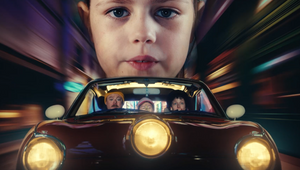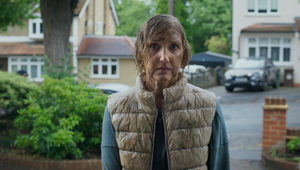
LBB Film Club: Van Wife

Merman’s Rachel Stubbings has recently directed the film ‘Van Wife’ in collaboration with Women’s Aid and LADbible, which sheds light on the insidious nature of coercive control in young people’s relationships. The film acts as the centrepiece of the ‘Spot the Flags’ campaign, a powerful initiative aimed at educating audiences – particularly younger viewers – on identifying and addressing red flags in relationships, before they can escalate to more severe abuse.
The catalyst is, of course, the ‘van life’ trend, where people ditch traditional housing for, you guessed it, living in a van. Or sometimes a bus, if they have enough money to cosy it up. ‘Van Wife’ juxtaposes the curated charm of the social-media-facing lifestyle of van lifers with the harsh reality of a controlling relationship. Liv and Jack are the main characters and we watch the young couple embark on their campervan journey, as the subtle yet concerning behaviours start emerging, leading to an intervention by Liv’s friend Duncan.
With a predominantly female-led crew and creative contributions from ‘Bad Sisters’ writer Ailbhe Keogan and Merman’s founder Sharon Horgan, the film captures the emotional and psychological nuances of coercive control. The project also benefits from the expertise and outreach of LADbible, whose social-first content ensures the film reaches a wide audience.
As coercive control cases surge – with over 43,000 reported in 2023 – campaigns like this underscore the urgency of addressing abusive behaviours early. Supported by personal stories like that of ‘Teen Mom UK’ star Mia Boardman, ‘Van Wife’ inspires viewers to recognize the signs, challenge harmful actions, and stand against domestic abuse.
Here, director Rachel Stubbings tells LBB’s Zoe Antonov more about creating this poignant piece of work.
LBB> Tell me about the conception of this film. What was the brief and how did you start working with Women's Aid?
Rachel> The brief was to tell a story for young people about young people that examines how small controlling actions can escalate into full-blown abuse, and how we all have a role to play in identifying the red flags. The project came about through Merman’s relationship with Women’s Aid, who were impressed by the nuanced and accurate portrayal of domestic abuse in the (BAFTA winning) series ‘Bad Sisters’. I’m on the Merman roster of directors and the initial idea really spoke to me and I immediately wanted to direct it. Luckily Sharon Horgan and Dearbhla Walsh wanted that too!
LBB> What was LadBible's role in the making?
Rachel> LADbible were later brought onboard via APX as a creative partner, financier, and publisher, and were the perfect collaborator for reaching and connecting with a widespread young audience, both in terms of outreach and digital expertise. They offered Ailbhe Keogan who wrote the script and myself invaluable knowledge about young viewing habits and social media trends.
LBB> Why did you decide to delve into the 'Van Life' trend when it came to the narrative? What did it bring to the story?
Rachel> ‘Van Life’ is a lifestyle that is hugely popular amongst young people worldwide. Ailbhe and I spent hours watching “aspirational couples” talk about their homemade vans. Plus the open road gave us the perfect backdrop to juxtapose the couples’ curated social media presence with the harsh realities going on behind the lens.
LBB> What was the casting for the film like and why were these actors chosen?
Rachel> Casting is always something I agonise over but it felt especially crucial to get it right with this project. It’s such an emotional and painful subject matter so making sure I had not only talented, but kind and empathetic actors was essential. And my goodness, they didn’t disappoint.
Katie Bignell who plays Liv was such a hidden gem introduced to me by our casting director, Kharmel Cochrane. I wanted someone with a fun, convivial, energy so it felt unexpected that we’d watch her light dim. Coercive and controlling behaviour like Jack’s slowly erodes confidence and self esteem and starting from a place of joy was important. I really think Katie’s a star in the making.
Sonny Walker, who played Jack, is someone I’ve had huge respect for ever since I saw him in ‘The Gathering’ on Channel 4. We offered him the part and I was so thrilled he accepted. I cannot stress how completely opposite Sonny is to Jack so it’s testament to his acting chops that he could bring Jack to life. He really believed in the cause and the script so he gave it absolutely everything even when it made him uncomfortable.
Jason York who plays Duncan is an incredibly thoughtful and funny actor who I’ve admired from afar for some time. He has the ability to really anchor his performance in reality which is definitely in keeping with my style. He and I have been in touch for a while about collaborating so when me and the Merman's team were discussing Duncan, I immediately thought of him. All the cast were phenomenal and lovely people to boot.
LBB> What was Women's Aid involvement like in the creative process and how did you work with them to reach the final result?
Rachel> Women’s Aid were truly fantastic to work with. They really put their trust in Ailbhe as a writer, and me as a director and what that did was give us the confidence to bring the red flags to life in an interesting way. Starting off subtle and then slowly edging the rug away. We all wanted to make sure Jack started off quite sweet and charming. The note I gave our fabulous director of photography, Linda Wu, for the club scene was “I want this to look fun and lovely but with a tone of too good to be true” so we could empathise with why Liv liked him… like we were giving Jack the benefit of the doubt despite our reservations.
LBB> What was the most complicated part of creating the film and how did you overcome these complications?
Rachel> The logistical element of making it look like Liv and Jack were on a road trip and having multiple locations was tough as we didn’t have long to shoot it so there was a lot of flying around and praying the sun didn’t set. In true British fashion, it also tanked it down with rain on one of the days we were going to do lots of beautiful cinematic shots outside which was a pain but actually, kind of fun in the end. One of our locations managers, Piers Hartard, found us a farm and so we parked the van in a barn there and lit it like it was sunny outside.
LBB> And likewise, what was the most fun part of it? Why?
Rachel> Crumbs, this is hard to answer. The shoot was so fun and full of laughter despite the dark subject matter. But I love a bit of dancing and I’d worked with Natricia Bernard, the choreographer on a commercial before and knew she was great. She only had a short amount of time with the actors at the costume fitting but thankfully both Katie and Jason picked it up really quick and had so much fun with it. The DoP did such a great job shooting it and I remember everyone at the monitor dancing along too.
Sitting with Becky Jones (AKA SaintSaviour) who did the score was so fun too. It’s amazing how much difference a score makes and how she elevated moments. It’s a skill that is so bewildering to me and she would take quite vague and generally very abstract notes from me and somehow know exactly what I meant and bring it to life.
Similarly, Rebecca Luff who edited the film was great to work with - I love working with editors who can take a moment and refine it into something more harrowing / more beautiful.
So many fantastic and talented women on this project. It was completely awe inspiring.
LBB> Tell me about something memorable from set and what it taught you.
Rachel> Wow OK. Well, there are so many moments but I remember being in the ferry port for the final scenes which was the last day of filming and had been really tricksy to light and we had tonnes of supporting artists and it was pouring with rain and we were all exhausted and I was watching Liv on the monitor come to the realisation that she needs to leave. I looked round at our predominantly female crew and you could honestly hear a pin drop. Clara Bennett (the producer) and I made eye contact and we both had salty eyes and goosebumps and I mouthed “I think we might’ve made a really beautiful film” and she just nodded back. It’s so important to step back and just breathe and remember why you’re all there and I need to do more of that on set.
LBB> What were you hoping that people take away from the film? And how did you make sure to translate this message through the creative?
Rachel> I hope this film highlights the importance of spotting red flags early doors and feeling duty-bound to call it out. We all need to do it, but it’s incredibly important that men recognise this kind of behaviour in their male friends, brothers, Dads… The character of Duncan was so important for that reason – he was the one who clocked that something wasn’t right, and then acted. I want people to watch this film and be more Duncan.















